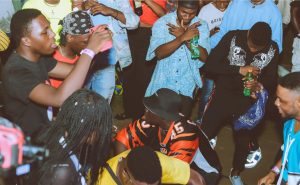
This frenetic, TikTok-ready sound is taking over the streets of Lagos—and beyond. But is it ready to go mainstream?
I’ll throw in some more adjectives: frantic, colourful, fun, free, almost punk. “Cruise came from the trenches part of Lagos,” DJ Khalipha told me. “[The people] don’t really like to vibe to slow songs there, so we play these faster songs and they love it. We’re trying to create something different from the Nigerian mainstream people already know. We want to increase the genres of music we have but also sometimes create a relationship with the mainstream.”
This hectic party music is the latest dance craze in Nigeria. The rhythms sometimes resemble techno or UK garage but are actually based on the wholesale sampling of amapiano and Afrobeats songs. The drums land at around 130 BPM, while everything else—samples, melodies, basslines—feel so sped up that they all end up as part of the rhythm section. The aesthetics are lo-fi and undeniably effective, and the genre’s key figures are young and heavily influenced by the everything-everywhere pace of TikTok.
DJ Khalipha, who hails from the Lekki peninsula to the south-east of Lagos, epitomises this quick-fire, DIY approach. He’s a self-taught producer who learned through YouTube tutorials and tenacious practice. “I first started DJing with just my phone, playing at different events with it and then moving to a PC and console,” he told me. “I also started producing beats with it, using an app called Beat Snap, and then professional software made specifically for music production.”
His passion for music goes back to his school days, when he loved drumming and singing for his classmates. “I used to beat match songs with just my mouth,” he said.

DJ Khalipha, Poco Lee and DJ Cora are three key artists at the forefront of cruise’s frenetic growth. The sound’s rough-around-the-edges style appears to speak to people in a way that the stars of Afrobeats are starting to struggle to do.
Cruise’s drums are dry and the mixdowns are generally wildly unbalanced, focusing on the mids and highs heard best through phone speakers. Vocal samples smash through the soundscape and limit everything else, building an aural hallucination that displaces and captivates the listener. The song structures are simple and repetitive yet thrillingly unpredictable. They seem to stumble, finish and then restart, losing themselves before coming back stronger a second later. This captures the feeling of living in an eternal, multicoloured present, close to the dizzying information overload of feverishly scrolling through video after video on social media.
This pace, sound and distribution style reflect the everyday lives of cruise’s creators’ in Lagos, one of the fastest-growing and most complex cities in the world. Despite its embryonic state, cruise is already becoming a staple in local clubs. It came from the distant suburbs and is now reaching both the coolest and wealthiest spots in town, bridging together different groups and classes of people. Given the recent worldwide success of Afrobeats, the general feeling is that this music can only get bigger—everywhere.
DJ Stainless, a major cruise figure from the outskirts of Lagos, believes Nigerian music is “going global.” But right now, cruise toes a fine line between global aspiration and hyper-local pride. There’s a reason why DJ Khalipha also calls the genre “street beats”: it’s still moulded primarily by life in Lagos. By 2050, Nigeria’s population will surpass the US, and the UN estimated its population in 2011 at between 500 million and one billion. It’s also one of the world’s youngest countries, with a median age of 18. This drives its buzzing and ever-changing culture.
Lagos is also at the forefront of Nigeria’s fast and sometimes brutal change. As the economic capital of Africa, it welcomes people from all over the continent and beyond, constantly evolving and looking ahead. Cruise reflects this tireless energy. Just listen to “Aborin N Tayin” by Dtop and DJ Professional Beatz. The drums, synths, samples and voices fuse into a frenzy, forming a monolithic groove that stops and starts at its own maddening pace. But what really shines is a synth that resembles a classical guitar, looping around the dense, rigid kick drums.
DJ YK’s “Bunch Of Women” is another highlight. This groovy, hilarious track is built around exaggerated synths and a sample of a woman speaking. “A bunch of women, surrounded in my room,” and then, “take it easy,” over and over, while the drums and synths chase each other around like Roadrunner and Bugs Bunny. The video for DJ Khalipha’s latest track with Poco Lee, “Obirin,” brings us into the middle of a carefree and colourful party, the music offering a carnivalesque atmosphere.
Cruise’s samples, drums and sounds are created and arranged in free DAWs like FL Studio. The genre features a distinctive drum loop, which is actually just the demo provided by the free version of the software (hence “freebeat”). The other key ingredients are samples of songs from across Afrodiasporic genres and voices snatched from TikTok. There’s been no shortage of talk on how the social media app is influencing the music industry, and cruise is no different, but it also has something of a unique position. This scene was not a pre-existing style that had to adapt to a rapid new form of consumption—it’s something fresh that actively exploits this new pace and sonic grammar to its advantage.
TikTok is how Ian McQuaid, founder of London label MOVES Recordings, discovered the genre. The outlet has released the only official and easily accessible cruise albums, and has a history of working with contemporary African music. “I was just looking at dances on it,” he said. “I found this DJ Cora tune, ‘Yeye Beat,’ that was really crazy. It had the log drums of amapiano but it was playing at 130 BPM. Loads of Nigerians were dancing to it and it just sounded so extreme—it blew me away.”
Amapiano is famously slow and steady, averaging around 113 BPM. Cruise kicks it up a notch, replacing the iconic smooth and jazzy sounds of the South African genre with wacky samples and percussive programming. What survives this rough treatment is the distinctive log drum sound, which is often mixed with the crash sound from gqom, another massive South African export. But compared to those precursors, cruise songs have a more pop-friendly structure—no long intros and instrumentals, instead focusing on short, to-the-point verses and catchy choruses. Perfect for TikTok.
“Just like the way hardcore records in the UK took older dance music records and sped them up to 140 BPM, that’s basically what the guys in cruise are doing, and pissing off loads of people in the process,” McQuaid said. “I often [talk] with a group of ‘old’ Nigerian DJs who moan and complain about these young guys. It’s so funny to me, because I’ve seen this before. [Innovation] has always happened like that.”
He added: “I grew up listening to and playing in punk bands, and also fell in love with the first wave of jungle and hardcore—high-tempo music, made by people with far more enthusiasm than technical ability or access to equipment. That chimed with me in the same way as a lot of UK drill artists—because they have that rawness and immediacy. [You have to] collapse the time between when someone thinks of something, when they make it on their computer and when it comes out.”
DJ Stainless lives more than two hours from Lagos in a town in the neighbouring Ogun State. “I’ve never learned studio production,” he said. “I just use my brain. I had this producer friend who showed me some things. But I never used [production] software for music production. I use VirtualDJ to make beats. Nobody knows how I create them, they all think I use a studio. I thank God for the wisdom he gave me.”
McQuaid said something similar just a few days before my conversation with DJ Stainless: a lot of the tracks are actually live performances. Recording and production methods remain shrouded in mystery, and everyone does things differently.
“DJs are taking other people’s tunes, pitching them very fast and cutting up two versions of the song, hammering the sample over the top of everything,” he said. “This looseness used to be a part of all dance music, when people were using hardware samplers to create loops by eye, observing the waveform. They were always a bit rough, a little bit off. Since the computerisation of it all, everything has become slick and on-point. Hearing something that has a human element to it, where things are a bit messy and all over the place, makes everything feel more alive and exciting.”
Cruise’s rough-around-the-edges style appears to speak to Nigerian people in a way that the stars of Afrobeats are starting to struggle to do. Afrobeats and amapiano are now global phenomena with a lot of money, influence and heavily polished sounds. Their focus is on reaching an international audience. Cruise is growing, but in a more organic and authentic way.
Moses Johnson, the Nigerian project manager for MOVES Recordings (who also works with Poco Lee), puts musicians, producers and artists all in the same basket: influencers. “The next stage for cruise is a huge co-sign from a big influencer,” he said. “One of the reasons that sounds travel across scenes and borders is because of the people that champion them. It happened with Afrobeats (eg. Drake and Wizkid), hip-hop and amapiano.”
Still, it’s hard to imagine a smoothed-out, mainstream version of cruise retaining the genre’s raw appeal. Johnson said it “was born as a response to the marginalisation of some people,” and this marginalisation has to be understood in terms of the sound itself, and what that sound represents. Cruise captures the chaotic and spontaneous pace of Lagos and its young people, not something refined or made to fit into the larger pop music machine.
“There is no formal vibe, no accreditation,” Johnson said. “Everything you’re seeing right now is very natural and organic. This is just the people in the grassroots that are saying to themselves—’You know what? We can do this, we can put this together, we can have our voice.’ It’s a representational form of music.”
So how can these two forces—cruise’s sincere spontaneity and its search for global success—coexist? The genre is now being exposed to European audiences (“it’s getting attention, and has been heavily claimed as garage music—but it’s really not garage,” Johnson said) and has been getting airplay on global stations like NTS Radio.
McQuaid is keen to support cruise’s rise but also to stay out of the way. “It’s an early days scene,” he said. “I’m conscious of not wanting to overly influence its development. Because who should do that is [people in] Lagos and Nigeria—that will be the best guidance for it. The minute you have international attention on stuff, some people get elevated and some people are forgotten about. We bring a distorting lens as Europeans. I’m acutely aware of this and I grapple with it a lot of the time—wanting to support music that I love and give people more opportunities to make more of this music, but also not wanting to be a corrupting influence and fuck things up.”
Ultimately, it’s all about awareness and being conscious that throwing a lot of money behind something pure might damage it. In that sense, middlemen like Johnson are very important. “No matter how original we try to keep [cruise], for it to transcend to the next level, there has to be some [outside] influence,” he said. “When Drake jumped on the remix of Wizkid’s ‘Ojuelegba,’ the sound remained authentic. And a new audience heard that. It merged two communities together. This happens across all music. That’s exciting, no?”







Leave A Comment
You must be logged in to post a comment.